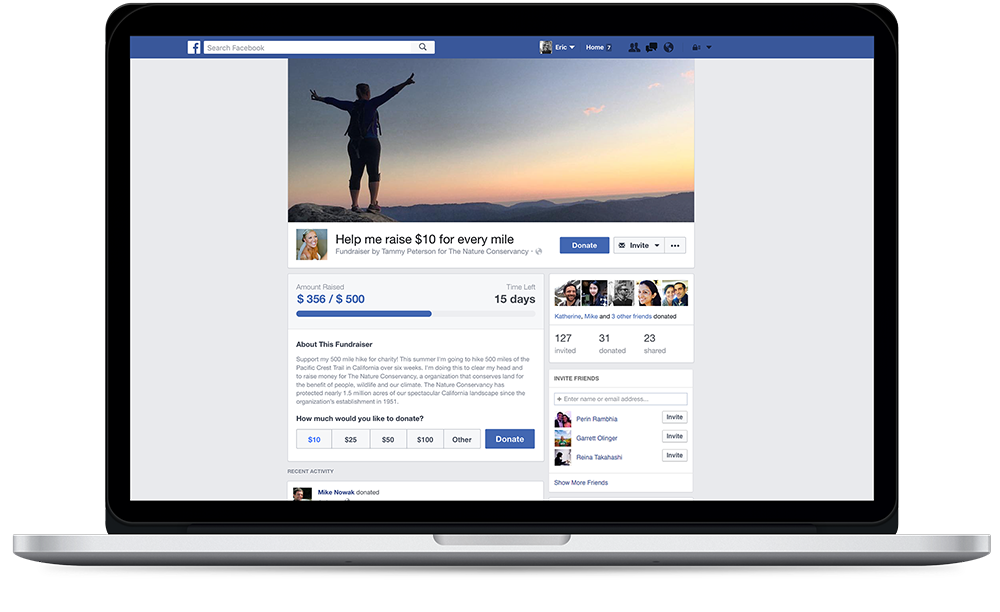This week Facebook announced the development of a new tool that will allow nonprofits to host fundraising activities and collect contributions directly on Facebook.
The new fundraiser pages are structured similarly to event pages. They allow users to contribute to a fundraiser, share the page with others and will show progress toward fundraising goals. The program is being piloted by several national organizations in anticipation of a wider roll-out in early 2016.
What does this mean for the nonprofits and social enterprises? How will this impact ongoing work? Will it replace other fundraising website platforms? There are three key areas for organizations to think about.
Ladder of Engagement
For those that have a large Facebook audience, this tool could provide an opportunity to move users up the ladder of engagement. If an individual likes an organization on Facebook but isn’t actively engaged with the organization, it is less likely that they’ll be regular donors. Most organizations struggle to move social media users up a rung on the ladder of engagement. This is a great opportunity to do so.
Cost
Obviously, the cost of implementation is going to key for many nonprofits. Matt Petronzio of Mashable shares, “Facebook is not currently charging its partners for using the products, but it will eventually implement a fee that covers operating costs at some point in 2016. The goal is to break even, not make a profit, the company says, and Facebook says it will charge a fee that is on par or less than the industry standard.”
If Facebook charges a set-up fee, it may not be palatable for organizations that have a limited budget for fundraising platforms or a small Facebook community. If Facebook uses a percentage of donation system – ideally give the donor an opportunity to cover the processing fee – it could be a game-changer for nonprofits and social enterprises. Many fundraising tools work very hard to integrate social media communication into their platforms. Facebook will be able to do this seamlessly and more effectively than any of them can.
Facebook Algorithm
How fundraisers pages are prioritized in Facebook’s algorithm is a key consideration. One of the potential advantages of this opportunity is that your fundraising campaign has the potential to reach a much larger percentage of your users than linking to a third-party fundraising link.
If the fundraiser page reaches the same limited audience that sharing a link to a third-party fundraising platform, the impact is limited. It will be interesting to see how this is prioritized in Facebook’s complicated algorithm.
Facebook’s announcement is exciting and has the potential to change the online fundraising marketplace. We’ll keep you up to date on new developments! Until then, enjoy these links from the week.
- There is a new Google+! Check out Google’s official blog to read what’s new and exciting.
- While Twitter’s decision to change from favorite to like was derided by some users, Drew Olanoff of Techcrunch reports that the change led to a 6% increase in likes.
- A Google Report shares that YouTube helps drive more donations to nonprofits. Heather Joslyn of the Chronicle of Philanthropy reviews the details.
- Christina Farr’s article on using technology to manage diabetes is a great read and includes a quote from Michael Chae – friend of SCC.
- Susan Carland found a unique way to deal with internet trolls. She donates $1 to UNICEF for every troll-y tweet that she receives. Kristen Brown of Fusion explains and shares examples of tweets.
- Finally, many in the nonprofit space have relied on Rick Cohen for their industry news and thoughtful commentary. Nonprofit Quarterly is one of my favorite places to catch up on news and Cohen’s writing was a large part of that. Cohen passed away this week. Our thoughts go out to his family and colleagues. The comments on this NPQ post share incredible stories and appreciation of his work.
Image for article: Facebook

Justin (he, him) is a Principal and Co-Founder of Social Change Consulting. He has over fifteen years of nonprofit experience, with expertise in online fundraising, digital communications, and data management. Justin helps organizations connect their communication strategy to their income development needs. When he’s not on the clock, Justin is exploring Berlin, running, listening to too many podcasts, and drinking too much coffee.
